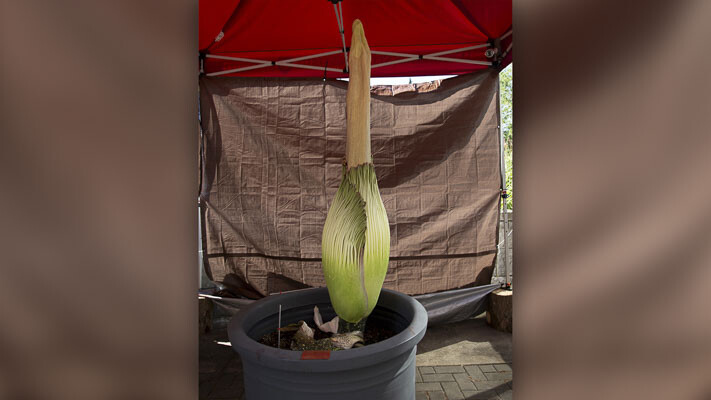
If you want to take a look and a whiff, visitation hours are 8 a.m.–7 p.m. Friday (June 30)
VANCOUVER – The rare corpse flower housed at Washington State University Vancouver is blooming. If you want to take a look and a whiff, visitation hours are 8 a.m.–7 p.m. Friday, June 30. Titan VanCoug, as the corpse flower is known on campus, is located in the Science and Engineering Building east ground floor entrance. Parking is free Friday only. Find driving directions and a campus map at vancouver.wsu.edu/campus-map-directions. Follow signs to parking and the viewing area.
Corpse flower blooms come and go quickly — just 24–48 hours. When they bloom, they emit an odor that is often described as rotting flesh. The odor attracts pollinators such as dung beetles and flesh flies that help ensure the continuation of the species.
Years ago, the plant’s corm (tuber) cloned. Now four plants reside in one pot. At this time, you can see a leaf, fruit from the 2022 bloom and the 2023 bloom. Seeing the plants in three different life stages at one time is unusual.
If you would like to forgo the smell of rotting flesh, you can see the bloom on the Titan VanCoug webcam vancouver.wsu.edu.
Titan VanCoug swag is for sale — T-shirts ($20) and totes ($10) — in the main level lobby of the Science and Engineering Building while supplies last.
About the corpse flower
The corpse flower (Latin name Amorphophallus titanum, also known as titan arum) is native to the limestone hills of Sumatra, Indonesia’s rainforests, the only place in the world where it naturally grows. They are among the world’s largest and rarest flowering structures. These plants are uncommon in cultivation. They bloom rarely—typically after seven to 10 years of growth and just once every four years or so afterward throughout a 40-year expected life span.
About Titan VanCoug
Titan VanCoug was raised by Professor Emeritus Steve Sylvester. He planted a seed from the University of Wisconsin-Madison’s titan arum plant, named Big Bucky, in 2002. He cultivated it in a pot on his desk until it grew too large to contain in such a small space. It has grown in a stairwell in WSU Vancouver’s Science and Engineering Building for some time. A late bloomer at 17, Titan VanCoug’s first bloom in 2019 was most likely delayed because its corm (tuber) cloned. A second bloom occurred in 2022.
Learn more by visiting vancouver.wsu.edu/titan-vancoug-live-bloom
About WSU Vancouver
WSU Vancouver is located at 14204 N.E. Salmon Creek Ave. in Vancouver, east of the 134th Street exit from either I-5 or I-205, or via C-TRAN bus service.
WSU Vancouver is in the homelands of Chinook and Taidnapam peoples and the Cowlitz Indian Tribe. As one of six campuses of the WSU system, WSU Vancouver offers big-school resources in a small-school environment. The university provides affordable, high-quality baccalaureate- and graduate-level education to benefit the people and communities it serves. As the only four-year research university in Southwest Washington, WSU Vancouver helps drive economic growth through relationships with local businesses and industries, schools and nonprofit organizations.
Information provided by WSU Vancouver Communications.
Also read:
- Letter: ‘We’re going to give them some money and a plane ticket, and then we’re going to work with them’Camas resident Anna Miller supports a new structured self-deportation policy, calling it a balanced approach to immigration and economic needs.
- Pro-Palestinian protesters occupy UW building, 30 arrestedAbout 30 protesters were arrested at the University of Washington after occupying a building and demanding the school cut ties with Boeing.
- Sen. Braun praises UW officials for response to Monday protests, calls for prosecutionsSen. John Braun praised UW officials for their firm response to violent protests tied to the university’s relationship with Boeing.
- Largest parade in Southwest Washington bands together for a better tomorrowThe 59th annual Parade of Bands in Hazel Dell will feature 24 high school bands and more than 120 entries on May 17.
- Don’t leave tax dollars on the table; learn about county’s tax exemption program at May 16 event in WashougalClark County tax exemption specialists will assist seniors and people with disabilities during a May 16 event in Washougal.
- Trades Tuesday is here, hoping to become a trend in area schoolsA new campaign is launching in area schools to inspire students to consider careers in the trades.
- Opinion: What the 2025 legislature tells us about why Washington’s government keeps failingTodd Myers of the Washington Policy Center argues that Washington’s government fails because it resists humility, experimentation, and accountability in its policymaking.











